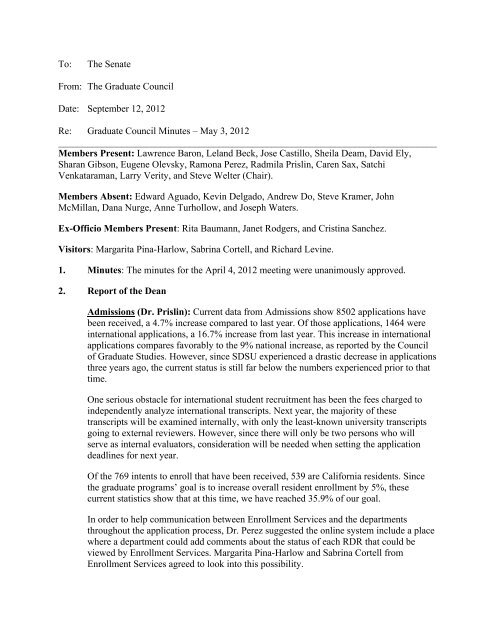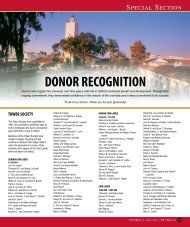May 2012 - NewsCenter - SDSU
May 2012 - NewsCenter - SDSU
May 2012 - NewsCenter - SDSU
You also want an ePaper? Increase the reach of your titles
YUMPU automatically turns print PDFs into web optimized ePapers that Google loves.
To: The Senate<br />
From: The Graduate Council<br />
Date: September 12, <strong>2012</strong><br />
Re: Graduate Council Minutes – <strong>May</strong> 3, <strong>2012</strong><br />
______________________________________________________________________________<br />
Members Present: Lawrence Baron, Leland Beck, Jose Castillo, Sheila Deam, David Ely,<br />
Sharan Gibson, Eugene Olevsky, Ramona Perez, Radmila Prislin, Caren Sax, Satchi<br />
Venkataraman, Larry Verity, and Steve Welter (Chair).<br />
Members Absent: Edward Aguado, Kevin Delgado, Andrew Do, Steve Kramer, John<br />
McMillan, Dana Nurge, Anne Turhollow, and Joseph Waters.<br />
Ex-Officio Members Present: Rita Baumann, Janet Rodgers, and Cristina Sanchez.<br />
Visitors: Margarita Pina-Harlow, Sabrina Cortell, and Richard Levine.<br />
1. Minutes: The minutes for the April 4, <strong>2012</strong> meeting were unanimously approved.<br />
2. Report of the Dean<br />
Admissions (Dr. Prislin): Current data from Admissions show 8502 applications have<br />
been received, a 4.7% increase compared to last year. Of those applications, 1464 were<br />
international applications, a 16.7% increase from last year. This increase in international<br />
applications compares favorably to the 9% national increase, as reported by the Council<br />
of Graduate Studies. However, since <strong>SDSU</strong> experienced a drastic decrease in applications<br />
three years ago, the current status is still far below the numbers experienced prior to that<br />
time.<br />
One serious obstacle for international student recruitment has been the fees charged to<br />
independently analyze international transcripts. Next year, the majority of these<br />
transcripts will be examined internally, with only the least-known university transcripts<br />
going to external reviewers. However, since there will only be two persons who will<br />
serve as internal evaluators, consideration will be needed when setting the application<br />
deadlines for next year.<br />
Of the 769 intents to enroll that have been received, 539 are California residents. Since<br />
the graduate programs’ goal is to increase overall resident enrollment by 5%, these<br />
current statistics show that at this time, we have reached 35.9% of our goal.<br />
In order to help communication between Enrollment Services and the departments<br />
throughout the application process, Dr. Perez suggested the online system include a place<br />
where a department could add comments about the status of each RDR that could be<br />
viewed by Enrollment Services. Margarita Pina-Harlow and Sabrina Cortell from<br />
Enrollment Services agreed to look into this possibility.
Dr. Welter emphasized the importance of providing personal attention to students<br />
throughout the application process, pointing out the impact this individualized effort can<br />
generate. Dr. Prislin added that last year’s resident enrollment numbers included students<br />
with non-resident tuition waivers; therefore, to compensate for these numbers,<br />
departments should recruit aggressively. To this end, this summer GRA is planning a<br />
series of workshops on how to attract and work with international students.<br />
Currently, there are 2489 RDRs in department review and not all of those are waitlisted<br />
students – the others should be returned, especially those who are rejected. During the<br />
meeting, Dr. Welter learned from Academic Affairs that if the graduate programs do not<br />
use their allocated numbers, they will be taken back and allotted instead to undergraduate<br />
students. Discussion ensued regarding what deadline the council would like to return the<br />
RDRs to Enrollment Services. Dr. Prislin reminded the group that the enrollment cap is<br />
for California residents only. Dr. Welter closed discussion by saying that next year, he<br />
will meet with the College Deans early to determine deadlines.<br />
Vote: GC decided that Dean Welter would advise Academic Affairs that the Council<br />
would like to request a deadline of <strong>May</strong> 31 st to get RDRs returned. However, if that date<br />
is not accepted, <strong>May</strong> 18 th will be the second date requested.<br />
3. Committee Reports<br />
• Curriculum Committee – None<br />
• Policy Committee Report (Dr. Prislin)<br />
The Policy Committee recently met to discuss the existing policy in regards to<br />
probation and disqualification. Page 434 in the Graduate Bulletin under ‘Probation<br />
and Disqualification’ reads:<br />
A post-baccalaureate graduate student in any admission category shall be placed<br />
on academic probation if the student fails to maintain a cumulative grade point<br />
average of at least 2.85 in all units attempted subsequent to admission to the<br />
university. Students in a graduate degree program in conditional or classified<br />
standing should consult the section of this bulletin entitled “General Requirements<br />
for Doctoral Programs” and “Basic Requirements for the Master’s Degree” for<br />
additional grade point average requirements for degree seeking students.<br />
The committee came to the conclusion that the current policy was an attempt to hold<br />
students to a reasonable policy that fits most students. The committee therefore<br />
chose to keep the existing policy but agreed that the Council should notify programs<br />
that if they wish to have higher standards, they may do so.<br />
Dr. Venkataraman asked if there was a mechanism in place that signals promptly<br />
when students’ GPA decreases to the point that triggers probation. Janet Rodgers<br />
answered that the system identifies critically low GPAs and the Office of the<br />
Registrars then puts the students on probation. Ms. Sanchez added a department is<br />
also able to disqualify or put a student on probation based on their own specific<br />
2
department requirements. However, if a department chooses to have higher specific<br />
department standards, such as a higher GPA, they will need to monitor their students<br />
themselves as the system is not able to do so.<br />
• Student Affairs Reports - None<br />
4. Old Business<br />
• LaTeX Thesis Review (Dr. Rich Levine)<br />
Revisiting an issue brought to GC in fall, most theses from the Mathematics department<br />
require a program known as LaTeX to create the thesis. LaTeX is standard for journal<br />
submission in the Mathematics field and while it is very good for type-setting, it can be<br />
difficult to create a template that follows the Dissertation and Thesis Manual’s (DTM)<br />
rules and regulations exactly. Peter Blomgren, an expert in LaTeX, created a template in<br />
September 2010, which was then approved by Montezuma Publishing (MP). However,<br />
since that time and some of the theses have been rejected multiple times. Dr. Levine<br />
proposes that, rather than these students going through the standard MP review process,<br />
MP instead approve a LaTeX template for each student to use and the department would<br />
review the thesis prior to submission to MP. Dr. Welter suggested that the department<br />
also provide a statement to MP along with each thesis, which would indicate that the<br />
department has reviewed the thesis and confirms that the MP approved LaTeX template<br />
was used. Janet Rodgers raised concerns previously voiced by MP that the references<br />
would not be checked and the preliminary pages would vary from the approved DTM<br />
format. Dr. Venkataraman answered that the preliminary pages are very close to the<br />
approved standard and Dr. Castillo added that the references are generated in the<br />
software, and so all of the citations and references would be correct.<br />
Vote: GC voted unanimously to support a department using an MP approved LaTeX<br />
template, which would be as close as possible to the Dissertation and Thesis Manual rules<br />
and regulations. Additionally, when a thesis is submitted for review to MP, the<br />
department would provide confirmation stating that the thesis has been reviewed by the<br />
department and the student used the approved LaTeX template.<br />
5. New Business<br />
• Faculty in the FERP program in the Graduate Bulletin (Cristina Sanchez)<br />
Dr. Aguado had raised the question of whether a faculty member who is in the Faculty<br />
Early Retirement Program (FERP) should be listed in the Graduate Bulletin. Ms. Sanchez<br />
brought out that currently some departments include these faculty members, and others<br />
do not. Council members were not aware if there was a clear policy on the matter and,<br />
therefore, Dr. Prislin suggested the Policy Committee research the subject and report<br />
back in fall.<br />
• NRTWs<br />
3
Dr. Welter opened discussion by suggesting that the Council raise issues and make<br />
recommendations today, holding firm decisions until the fall semester.<br />
Priority Listing: Dr. Prislin reviewed the current NRTW priority list, which is as<br />
follows:<br />
1. Continuing international students recruited on a waiver and in good standing.<br />
2. New JDP/MFA students.<br />
3. Students on a fellowship (McNair/Fulbright).<br />
4. Students from funded grants in which a NRTW was included as cost-sharing.<br />
5. Other incoming non-resident’s (master’s).<br />
Dr. Prislin reminded the Council that if the top two priorities were strictly adhered to<br />
during round one distribution, there would not have been enough waivers even to fulfill<br />
those two categories. Dr. Perez asked why MFAs are given priority when there are more<br />
terminal degrees than MFAs. Dr. Verity added that although master’s programs are at the<br />
bottom of the list of priorities, they outstrip the other categories in total number of<br />
programs. Dr. Welter added that when considering the ranking of priorities for waivers,<br />
the Council should consider who we want to be and where we want to go. Dr.<br />
Venkataraman added that if the JDPs were to receive all of the waivers, then master’s<br />
students would be subsidizing the JDP students, which he would not approve of.<br />
Additionally, he asked why Foundation is not involved in funding of the NRTW program<br />
considering JDP students are receiving waivers and it is they who are generating research<br />
and funds to Foundation. Dr. Welter answered that given the Foundation’s current<br />
economic challenges, their contribution to the program would not be a current solution.<br />
Dr. Perez warned against slipping into a business model in an academic environment. She<br />
explained that if Foundation were to begin to invest in supporting waivers to those<br />
departments who contribute the most of the grant money, then some colleges would be<br />
disadvantaged. Additionally, she warned that this kind of approach would further<br />
undermine parts of the university that many say do not receive enough attention already.<br />
International Graduate Programs: Dr. Perez brought out that her department has a<br />
concurrent graduate degree program with a partner institution. When the contract was<br />
originally negotiated, the number of students was established and the process of exchange<br />
decided upon – some students would begin at <strong>SDSU</strong> and then go to the partner<br />
institution, and vice versa. However, since <strong>SDSU</strong> is a degree granting institution, the<br />
students who begin at the partner institution and then come to <strong>SDSU</strong> are required to pay<br />
the non-resident tuition while at <strong>SDSU</strong>. However, those beginning at <strong>SDSU</strong> and then<br />
attending the partner institution are not required to pay these fees while at the partner<br />
institution. Dr. Welter suggested this category of students be considered as an addition to<br />
the top of the priority list. Additionally, Dr. Welter suggested we add to the discussion in<br />
the fall what happens when a program makes a mistake during the NRTW nomination<br />
process.<br />
In closing, Dr. Welter thanked Drs. Castillo, Do, and Olevsky for their service to the<br />
Graduate Council – since they have now completed their second terms, they will not be<br />
returning to the Graduate Council in fall.<br />
4
Adjournment 3:30pm<br />
5




